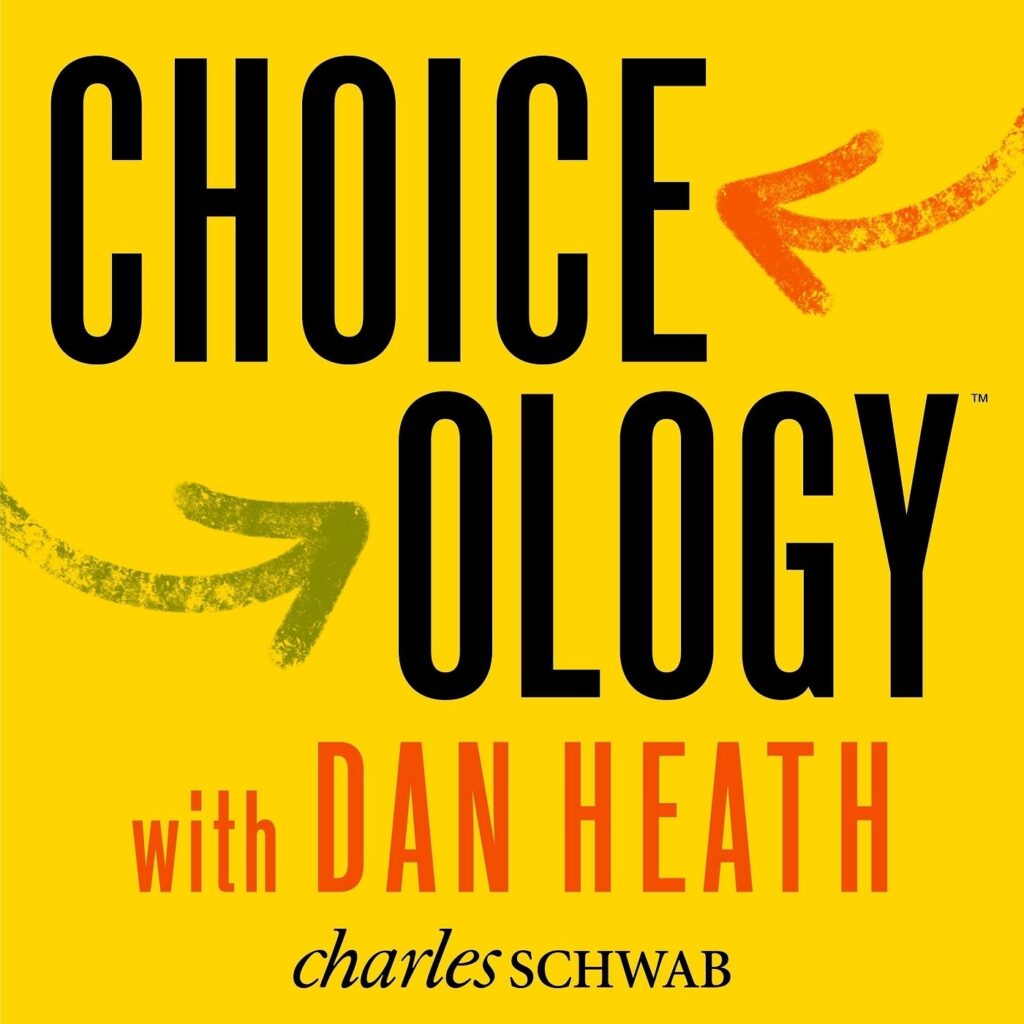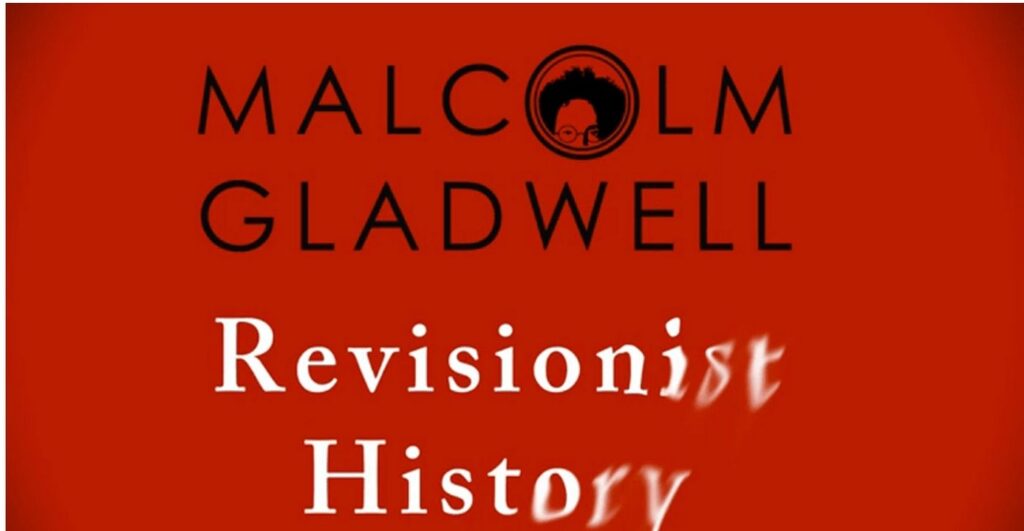Why Best-Selling Authors Make Amazing Podcast Hosts

“These are people who understand the power of story and that stories are everything.”
Dan Heath has written multiple best-selling books with his brother Chip, including Made to Stick, Switch, Decisive, and their new release, The Power of Moments.
As of this week, he’s doing something new.
Dan Heath now hosts a podcast, putting him in the company of other high-profile writers like Malcolm Gladwell, Walter Isaacson, and soon, Michael Lewis.
Dan and I spoke about the new show, why he’s stepping into a new medium, and why podcasts are such a fantastic fit for authors.

1. The Choiceology Podcast
Steve: What’s the new podcast about?
Dan: Choiceology is about studying choices — we’re trying to do forensic analysis on high-stakes decisions, ranging from people making life or death decisions on Mount Everest, to admirals duelling in a critical World War Two battle, to communities using graffiti to try to fight crime, and all the way down into how to trick yourself into saving more for retirement. It’s a show about how to shape the decisions that shape our lives.
Steve: Why are these decision-making principles — known as behavioral economics — an important set of ideas for average people to understand?
Dan: We all feel like we’re making decisions in sound and rational ways. But we fall prey again and again and again to the same finite set of biases.
On one of our shows we talk about the sunk cost fallacy, for instance, which is related to the feeling of attachment we get when we’ve invested a lot in something. It might be a financial investment or it might be an investment in a relationship or in a project. And when we’ve invested so much of ourselves, we find it very, very hard to take a fair view of the future potential or value of that thing. The old expression, “throwing good money after bad,” is an example of the sunk cost fallacy. In the podcast, we’ll talk about a case in which this bias influenced a decision that cost a man his life. Of course, there are hundreds of other ways that it can have less dramatic effects on our life, too, but in all cases, it can interfere with us making smarter choices. So one of the themes for the season is: How can we fight back against these decision-making traps?
Steve: Do you have any big goals for the Choiceology podcast?
Dan: My hope is that this podcast gets people thinking about the way they make decisions, and that it ultimately improves the way people make decisions. It’s really as simple as that. We’ll be discussing biases that have plagued mankind for centuries. These are big, powerful themes. A thousand years ago, people were struggling with these exact same things: How do you get the information that you *need* to hear rather than *want* to hear? How do you toe the line between confidence and overconfidence? How do you know when to double down and when to give up? So we’re trying to rediscover these themes that are age old and put them in a package that’s fun and fresh and relevant and personal.
2. Why Host A Podcast?
Steve: You have written several best-selling books with your brother. And now you’re podcasting. You’re part of a growing trend of high-profile, best-selling authors that are moving into hosting podcasts. Why do you think a growing number of recognizable authors are taking this path?

Dan: Well, I think somebody like Malcolm Gladwell or Seth Godin … These are people who understand the power of a story and that stories are everything. That even the most fascinating or insightful idea will find its best showcase in a story. And so naturally, the people who tell great stories in print would feel the itch to tell great stories verbally and with the support of production. And all of a sudden, you’re not just learning about a battle, you’re hearing it. And you’re not just reading a quote from an expert, you’re hearing the expert talk in his or her own voice. And that’s a powerful thing. It’s a powerful lure for committed storytellers.
Steve: Why did you personally decide to do the podcast?
Dan: Part of it is I’m interested in the sausage-making of podcasts. I’ve been a fan of podcasts for a long time and here was a chance to jump the fence and be on the production side. So it’s kind of like you’ve been watching movies your whole life and then someone offers you a chance to act in one. Well, of course I want to do that. And the material here is also fascinating to me. My brother Chip and I wrote a book about decision making and Choiceology gave me a chance to come back to those same themes, but with a very different approach.
What’s fun for me is this chance to be part of an ensemble — the work of writing can be isolating. Versus with a podcast, you’ve got a dozen different people doing things and we’re all working on the same Broadway show together. And that makes it a lot of fun.
Steve: Tell me a little bit about storytelling as a learning strategy in this show, where you’re trying to help people understand some relatively complicated ideas.
Dan: These scientific ideas are readily available. You could go do a Google search right now for “confirmation bias” or “overconfidence” or “sunk cost fallacy” and access the same journal articles that everybody else in the field is using. But there’s a limited audience for that. There aren’t many people who want to read journal articles in their spare time.
And yet the material — the actual meaning of the ideas that are in these journal articles — applies to everyone. Everyone makes decisions. Everyone wants their decisions to be better. And so to bridge that gap, the best vehicle we have is to tell stories. Our mission on this show is to bring the science to life.

3. Public Speaking versus Podcast Hosting
Steve: You do a lot of speaking engagements — how is podcasting similar and how is it different?
Dan: I think there’s something special about the podcast medium. Don’t get me wrong: Giving a speech is an amazing and rare opportunity in this world — you’re getting forty-five minutes of an audience’s captive attention in a room where the lights are down and you have a chance to tell stories or share ideas. It’s a precious thing. And I think podcasts are precious in many of the same ways except that the audience can be a million people if you’re somebody like Malcolm Gladwell. It’s a chance to kind of be in that darkened room, sharing your thoughts, but on a one-on-one basis.
And unlike a speech, I think there’s a production element to podcasts that’s an important part of the mix. There’s literally a person with the title “showrunner” on Choiceology. And that’s significant. It means we’re crafting this. It’s not one person on a stage. It’s many people laboring over the details and sweating the small things. And I think that combination of being personal and being produced is magical.
Here’s how you can listen to Choiceology, Dan’s new podcast about how to make your big decisions better:
Google Play Music
RadioPublic
Sign up for the Pacific Content Newsletter: audio strategy, analysis, and insight in your inbox. Once a week.
